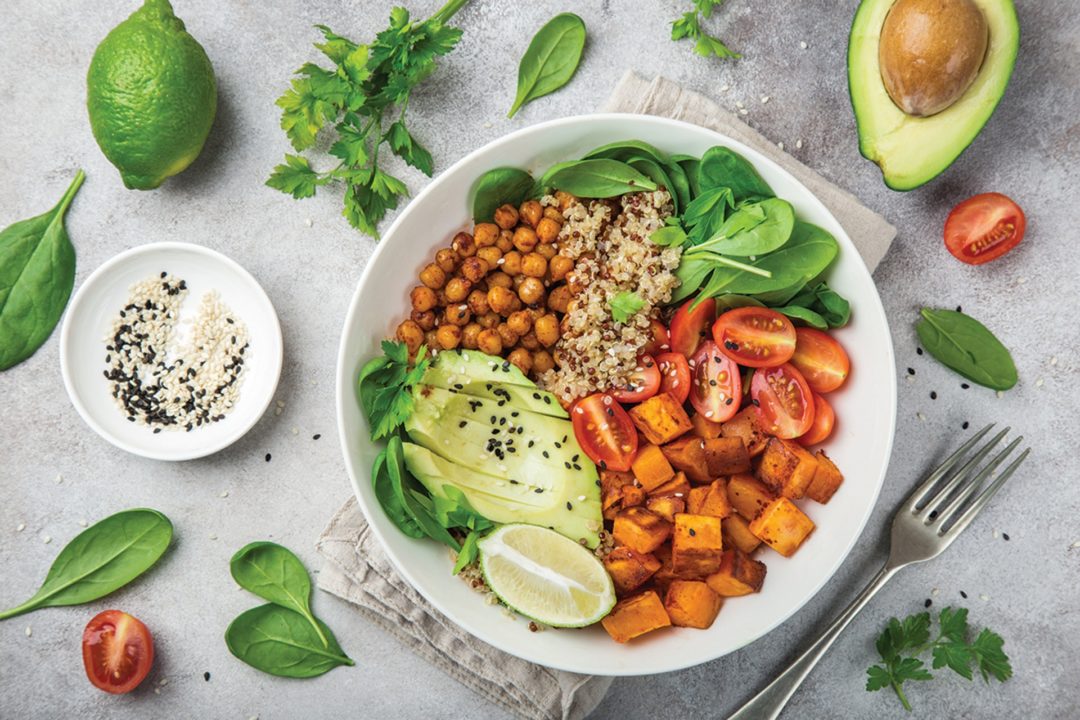The world’s dietary profile is becoming increasingly health conscious. The mindset of “it’s cool to take care of yourself” is catching on, and people are looking for the best ways to do so. While the options are virtually endless, a popular route is cutting meat, dairy, or even processed foods out of one’s diet.
For many, inspiration comes from the concern for personal health. For others, it’s the welfare of the environment (pollution from factory farms) or the welfare of animals. Maybe it’s a little bit of everything. Whatever the case may be, there are plenty of great reasons to consider embarking on a vegan or whole food, plant-based diet.
Defining the Diets(Obvious and Not-So-Obvious Differences)There are many subcategories we could talk about (dietary vegans, ethical vegans, etc.), but rather than getting too nit-picky, we’ll just break down the two main diets at hand:
A whole food, plant-based dietfocuses on whole or minimally processed plants such as nuts, legumes, vegetables, fruits, whole grains and seeds, while avoiding any meat or animal-derived foods — including eggs, dairy, and the like. This diet operates under the belief that processing robs foods of their vital nutrients and full “nourishing” capabilities (1).
A vegan dietalso excludes any animal proteins or animal-based foods. However, unlike the whole food, plant-based diet, a vegan diet can contain processed foods including cheese and meat substitutes, olive oils, cookies, and most candies. Even Oreos are vegan (1). Therefore, being vegan doesn’t necessarily mean eating no junk food.
While not all vegan foods are plant-based whole foods, all plant-based foods are vegan. The one exception to this rule is raw honey, which is technically a non-vegan, plant-based, whole food. It’s a fine line, but this distinction comes down to the vegan belief that if an animal is involved in ANY part of the product manufacturing process (in this case: honey bees), they don’t want anything to do with it (1).
This brings us to an important difference between these two diets: “Veganism” encompasses an entire lifestyle rather than just a mere diet. Most vegans don’t wear animal-derived garments (leather, fur), use animal-based products in their households, etc.
Therefore, if your main motivation is the ethical treatment of animals, going vegan is a perfect move. If your motivation is losing weight, pumping up your immune system, and getting healthy, the whole food, plant-based diet is your best bet. Also, depending on your beliefs and goals, you can tweak a diet to your liking. Whatever works for you (2).
Health BenefitsIn addition to obvious benefits like weight-loss, staying lean, and maintaining healthy blood sugar levels, reports from the American Dietetic Association state that vegan and plant-based diets are associated with reducing the risk of heart disease, colon and lung cancer, osteoporosis, diabetes, and other diseases in the long term (3). Also, studies have shown that “a plant-based diet increases your metabolism. For at least 3 hours after a meal, your body will burn calories over 15% faster than bodies on meat-based diets” (4).
Getting the Right Nutritional BalanceA big misconception is that vegan or plant-based diets are deficient in protein and certain nutrients (5). While it is entirely possible (especially for beginners) to have a lack of B12, protein, or calcium if not supplemented properly, you’ll be fine as long as you stay informed and give your body what it needs.
For example, since vegans pass up animal-based protein, they must get it from other sources like beans and brown rice (5). When it comes to complete proteins (aka amino acids), vegans can get everything they need from whole grains, seeds, and nuts. Plus, “when you get protein from these sources, it usually comes with a key nutrient that is severely lacking in meat-based protein—dietary fiber” (3).
Vegan and plant-based eaters can also have peace of mind knowing that product manufacturers often formulate their vegan foods with the special nutritional needs of their customers in mind. Since vitamin B12 is typically lacking in a vegan or plant-based diet, brands add B12 and other key nutrients like vitamin A and calcium to many dairy substitutes (5).
For Those Concerned about Flavor…No need to worry! Maybe more common than misconceptions about nutritional deficiencies are misconceptions about flavors lacking in a vegan or plant-based diet.
That may have been a somewhat legitimate concern a few decades ago. But it’s 2018, and product manufacturers have had time to accommodate the growing vegan and plant-based consumer base with delicious “faux” products, so the stigma of “blandness” with these foods is fading away.
Also, it’s all about what these diets include, not exclude. Focus on expanding your culinary horizons, rather than thinking of the transition as a food-elimination process. Stay positive, explore new foods, and try something out of the ordinary. You’d be surprised how many awesome vegan and plant-based foods are out there that you’ve probably never heard of!WF
References:
1. Oliveira, Rosane. “The Great Vegan vs. Plant-Based Debate.” UC Davis Integrative Medicine, 17 Feb. 2015, ucdintegrativemedicine.com/2015/02/the-great-vegan-vs-plant-based-debate/#gs.kQPhU2U.
2. Patrick, Molly. “Veganism Versus A Whole Food Plant-Based Diet: What's The Difference?” Mindbodygreen, 11 Mar. 2016, www.mindbodygreen.com/0-24031/veganism-versus-a-whole-food-plantbased-diet-whats-the-difference.html.
3. Agin, Katie. “No Meat, and Still Plenty to Eat.” Whole Foods Magazine, 29 Mar. 2010, wholefoodsmagazine.com/grocery/features-grocery/no-meat-and-still-plenty-eat/.
4. Oliveira, Rosane. “Ever Wondered What 'Vegan' Really Means?” UC Davis Integrative Medicine, 1 Nov. 2015, ucdintegrativemedicine.com/2015/11/ever-wondered-what-vegan-really-means/#gs.9d4MsoU.
5. Chiarello-Ebner, Kaylynn. “Veggin' Out.” Whole Foods Magazine, 1 Apr. 2009, wholefoodsmagazine.com/grocery/features-grocery/veggin-out/.

2025 Natural Choice Awards
March 31, 2025








